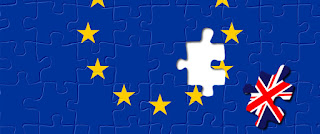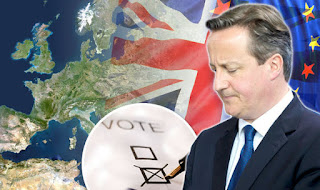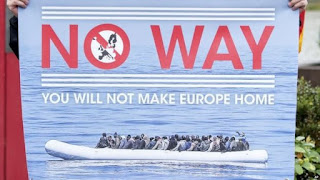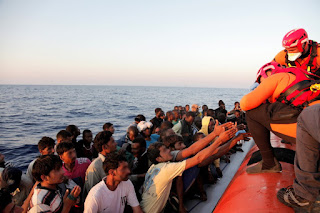With 51.9% of the votes, the United Kingdom will be leaving the EU by 2019. Many EU officials and politicians have called for a quick "divorce," to avoid damaging long term Europe's economy by dragging the negotiations for too long.
The outcome was expected. For many years, not just Britain but all of the continent's governments were allowing populism to thrive. They failed dealing with the economic crisis quickly enough and in addition, they made serious mistakes when responding to the Syrian refugee crisis.
They forgot that populism always wins. It is easier for people to understand an argument about issues that affect them directly, in the plain language that demagogue Far Right or Far Left politicians were using.
Instead of this, national governments were continuously scapegoating the EU for all that was wrong in their economies. They have purposely avoided explaining to their citizens how the block works and what benefits it offers.
And that simply to engage in political games, with aim to gain an upper hand in their country's internal politics, while perpetuating their rule and power. They ignored the interests of the ordinary people and deliberately allowed them to be misinformed for years, to serve local elites.
They never wished for the EU and its institutions to replace them in the hearts and minds of the voters. Why would they after all? They preferred citizens to trust them when it came to dealing with issues that were of concern and keep voting for them.
But it was not the EU that failed the citizens during the economic or the refugee crisis.Its institutions did not have much say on how each state would deal with the amount of people pouring from the Middle East.
In each case, it was the national governments that decided which policy they would follow, opening the borders like Germany or Sweden, or hermetically closing them like Slovakia and Hungary to refugees. It was our own rulers who were delaying the process and hindering a quicker response to the problem.
Additionally, it was not the EU that followed disastrous economic policies for decades, leading to the economic crisis which affects millions of Europeans now. Each national government has either decided alone or in agreement with its EU partners and the block's institutions and laws, which they have accepted and voted for, on their financial policies.
Where the EU is largely at fault, is that they remained too detached from the citizens for decades. It mainly focused on the financial nature of the union, while it did little to remain relevant in the citizens' every day expectations and problems.
In addition, it responded in a very technocratic- often arrogant- manner to the financial crisis, ignoring the warnings or voices of analysts with a different approach.
They acted with absolute disregard to the ordinary peoples' needs while they were quick to appease European banks. Thus proceeding with disastrous austerity policies, in the case of states like Greece.
As result, the EU became the poster-child of the euro-zone crisis even though it was not entirely its fault.
 When it comes to Britain itself, its political leadership allowed for decades wealthy populist con-men to brainwash and misinform people through media, misrepresenting the reality on the country's EU membership.
When it comes to Britain itself, its political leadership allowed for decades wealthy populist con-men to brainwash and misinform people through media, misrepresenting the reality on the country's EU membership.On that, most recent British politicians are to be blamed not just David Cameron. They allowed the bubblegum of "Britain is Great and we pay too much in Europe" to go on for years.
Maintaining this arrogance and nationalism among the political elite and the people, resulted in the populist politics bursting at their faces in the recent referendum.
Subsequently we witness an extraordinary set of developments, as an aftermath. David Cameron himself announced his resignation by October. The Labour Party is in turmoil facing a number of resignations, while Scotland and Northern Ireland expressed their intentions of looking into ways to leave the UK altogether.
The Scottish in particular, which voted for staying in the EU are causing the most ripples. The country's First Minister Nicola Sturgeon, hinted at how undemocratic it would be for Scotland to be dragged out of the European Union, after having voted by 62% to remain.
Mrs Sturgeon has appeared to suggest that the Scottish Parliament could block Britain's exit from the EU, or it could hold a second referendum to leave the centuries old union with the rest of the Kingdom. Could this be the end of the Europe and Britain as we know it?
In a worse case scenario if the UK leaves the EU, we could see the dissolution of the country and Scotland and N. Ireland rejoining the block in time. Yet Britain's departure could cause negative side effects throughout the continent.
Most European Far Right leaders, like France's Marine Le Pen and Holland's Geert Wilders have hailed the British referendum outcome, hinting that they will try to achieve the same for their own countries.
If they succeed, we will have the dissolution of the EU, a work in progress since WW2 and the most admirable achievement of Europe. The economic, social and political chaos that will follow, should scare any reasonable person in this continent.
Additionally we could see the return and rise of fascism, nationalism, xenophobia and extremism in Europe, in forms that we haven't experienced since the end of the last big war.
On a more positive tone, it will never come to this. If Britain eventually leaves the union, it will most likely join EEA/EFTA, thus not much will change. But it will take a lot of negotiations and political skill from their part, to convince the rest of Europe to accept them as a member of these blocks.
As the remaining European powers will most likely want to make an example of the UK and punish it, in order to forbid other Euro-skeptic nations attempting something similar. Just as they humiliated Greece so that other member states could hastened reforms, Britain could pay a high price in order to punish all these states who also might want out.
Another positive outcome from this referendum, could be that the rest of Europe may proceed with further integration now. Britain was always the most vocal member state advocating against such development and since now is on its way out, pro-European and federalist powers could finally achieve their goal.
If of course others don't decide to leave. Britain has a lot of allies and close partners in the union. Sweden, Denmark and Ireland, all joined the block because Britain did initially.
The case of Ireland is particularly interesting. The small nation shares close economic ties, plus the only land borders with the United Kingdom. What will happen to it when Britain leaves? While the Irish are pro-European and most likely to integrate themselves further in EU by joining the Schengen Agreement now that Britain is out, things could go the other way too.
If the Germans and the French are not careful and push too hard for fast and uncompromising federalization of Europe, they could hurt Ireland's economy even further. Because the country is closely relying on Britain, with a Brexit it will become one of the worse affected nations in the EU.
If the Franco-Germans corner the small nation to abolish its corporate taxation system and harmonize it with the rest of Europe, they could also push the Irish out of the union and in the hands of the British-Americans out of desperation.
These are of course scenarios, as there are many who believe that the UK won't have to leave the EU after all.
British Labour MP David Lammy has called on Westminster to "stop this madness" and to vote against the referendum decision to leave the EU. He claims that the the referendum was an"advisory, non-binding referendum."
"We can stop this madness and bring this nightmare to an end through a vote in Parliament. Our sovereign Parliament needs to now vote on whether we should exit the EU." (The Independent)
In addition there is a petition which has already gathered over 3 million votes, calling for a second referendum. Could the above developments indicate that the British citizens and leadership do not really want to leave the EU?
Is all this fiasco with the referendum an effort to expose, silence and finally eliminate Britain's Euro-skeptics? They have been blocking their country's further integration into the union, plus the EU's progress in a fully fledged functioning federation.
Could their victory become their end? It is debatable if they have the skills to lead Britain and navigate it out of the mess they brought the country in. If there is any chance of getting rid of them for good, it could well be to seemingly get their way, fail and disappear for good.
If the UK leaves the union, then forced to rejoin due to the extreme economic penalties it could face, it will then be forced to join both the Schengen Agreement and the euro-zone. Could this disastrous outcome become the Euro-skeptic's Pyrrhic victory, which could lead to a better EU and Europe?
A reformed EU, that will be kick-started by Britain's departure and the need for further coherence in the remaining member states, could just be all that Europe needed all these years. The union has hit a wall; politically, financially and socially.
Could the outcome of the British referendum, actually be a blessing in disguise for both the UK and our continent?















